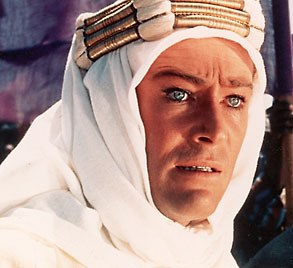They say you should never meet your heroes. In 1996, I was 21 years old, an age for believing in heroes, and Peter O’Toole was as big as they came. Lawrence of Arabia wasn’t just my favourite film, I was obssessed with it. I’d watched my old VHS copy so many times I’d worn out the best scenes; I’d trekked to a revival showing in a cinema just to see it on the big screen; I’d hunted down copies of O’Toole’s other films in obscure video stores in London: The Night of the Generals, The Stuntman, My Favourite Year, What’s New Pussycat?, The Lion in Winter. When his memoirs came out, I abandoned my university studies and read nothing else for a week.
So when I heard the man himself was coming to the Oxford Union, I dropped everything to get my hands on a ticket. I turned up so early I was the only person in the room — but that was just as well because the organisers had underestimated the level of interest, and the place was overflowing by the time O’Toole arrived.
He made the sort of entrance a movie star should, trailed by photographers and publicists, camera flashes lighting up the gloomy old Victorian interior, and he was dressed exactly the way you’d want Peter O’Toole to be dressed: white suit, flowing silk cravat, cigarette holder. The photographers were crowding into the already over-packed room, shouting out instructions to O’Toole, blocking the audience’s view, and generally taking over in the way paparazzi do, and I feared we were just going to be bystanders at a carefully choreographed press event.
But O’Toole posed for a few pictures, then airily dismissed the photographers. “You can go now,” he said. They stood a moment, unsure what to do: the gentlemen of the press weren’t used to being ordered out of the room, but O’Toole wasn’t the sort of man you argued with. He turned those blazing eyes of his on them, and they fled.
“Now they’ve gone we can talk,” he said, arranging his long limbs in a chair at the front of the room. Without further preamble, he asked for questions. There was a ripple of nervous laughter: O’Toole had a reputation, and we weren’t used to seeing the press so easily browbeaten. Summoning up my courage, I raised a hand.
I asked, of course, about the making of Lawrence of Arabia, and got what remains to this day the longest and most dazzling answer I’ve ever had to a question. It went on about half an hour, full of glorious anecdotes of getting drunk with Omar Sharif and filming camel battles and the searing heat in the desert, and culminated with O’Toole telling how the desert sky was so clear he once saw a star at midday — all in that mesmerising voice, full of uncharted depths. He was speaking very softly, an actor preserving his instrument, but with such precision you could make out every syllable.
He was everything you’d want him to be, he made that cavernous old library seem too tiny to hold him, and spoke in his own private language, in which the train was the “rattler”. He was there promoting the second volume of his memoirs, and I remember some one asked if he thought it was odd for an actor to become a writer. “Not really,” he said with an insouciant grin, “there are precedents. Shakespeare, for instance…”
After the event was finished, I saw O’Toole standing outside and went up to ask him to autograph my copy of his memoirs. I was a little nervous after seeing his treatment of the paparazzi, but he couldn’t have been more generous. He didn’t just sign my book, he started a conversation. What was I planning to do in life, he asked, and when I told him I wanted to be a writer he advised me to read the works of Geoffrey Household. At one point, and I know this sounds ridiculous, he asked what role I thought he ought to play next.
The publicist came over and told him he was wanted in some other room to sign books. I backed away, but O’Toole turned to her and said witheringly “Can’t you see I’m talking to my friend here?” Eventually some others plucked up the courage to come and join the conversation, and he was just as generous with them — he was, it seemed, open to anyone who wanted to talk to him on a human level, inimical only to the impersonal rituals of fame.
Time had already claimed its wages of him, the hair was grey and the face lined, but I remember he fixed those blue eyes on me and they were still Lawrence’s eyes, that had burned themselves into the minds of a generation, and I couldn’t believe the image that held so much power and fury on the screen was standing before me flesh and blood.
They say you shouldn’t meet your heroes, but in Peter O’Toole’s case they were wrong. He was, in real life as on the screen, every inch a superstar. I still have that signed copy of his memoirs, by far the best actor’s autobiography I’ve read. My old videos are long worn out: I have his films on DVD now, and he’s still my favourite actor. At his best he was simply immense, capable of a dangerous, fragile power.
What sums him up best for me is a line Lord Byron wrote of one of O’Toole’s own heroes, the great 19th century actor Edmund Kean: “Thou wert the sun’s bright child”.



Leave a Reply